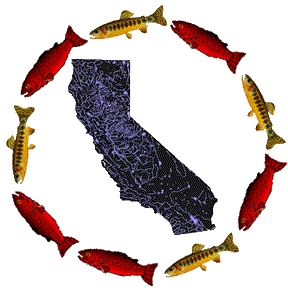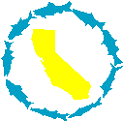CSPA |
| Your 501(c)(3) tax deductible cash donations are desperately needed if the fight for our fisheries is to continue. Read how you can donate! |
For Email Marketing you can trust |

 More News
More News
![]()
 CSPA only fishing group to testify in State Board hearing regarding emergency drought petition for change in outflow standards for Sac
CSPA only fishing group to testify in State Board hearing regarding emergency drought petition for change in outflow standards for Sac
February 20, 2009 -- CSPA's Executive Director, Bill Jennings and CSPA director and attorney, Mike Jackson, emerged from two brutal (exhilarating?) days of evidentiary hearings at the State Board over the emergency drought petition by the Department of Water Resources and the U. S. Bureau of Reclamation (DWR/Bureau) to relax outflow standards by pitting salmon against Delta species. The two agencies are asking that required winter flows in the Sacramento designed to improve the health of delta fisheries be reduced with the intent to use the saved water throughout the year to help severely impacted salmon runs.
Valley salmon runs are at their lowest in history with less than 67,000 natural and hatchery chinook salmon returning to the Sacramento system in 2008 according to the Pacific Fisheries Management Council. This is the lowest return for salmon in the system in history and surely will lead to almost certain closure of the recreational and commercial salmon fishery this year, 2009. Given low upstream reservoir storage and expected high temperatures, next year may even be worse than this year.
However, the Delta fisheries are equally impacted. DFG's fall mid-water trawl (Sept-Dec, 2008) show indices for delta smelt, American shad, splittail and treadfin shad to be at the lowest of the 41 years on record. Young of the year striped bass indices is the sixth lowest and the last 7 years represent the lowest of 41 years of records, and longfin shad indices are the fourth lowest on historical record. The mandated winter releases were designed to give these fisheries some relief, especially the Delta Smelt, a fish listed on the endangered species list.
CSPA was joined by South and Central Delta Water Agencies, Butte Environmental Council, the Bay Institute and Environmental Defense. Each of these organizations provided pertinent testimony at the hearings. Mike Jackson of CSPA did an exceptional job of cross-examination while Bill Jennings of CSPA provided telling direct testimony. Jennings pointed out that the state water board had issued more than eight and a half times more water than comprises the delta's average unimpaired flow. He emphasized that the export water rights are the most junior of all of the system's water rights and consequently, farmers using delta exports cannot rely on water every year.
DFG NMFS, and USFWS submitted vague policy statements supporting the DWR/Bureau but refused to submit testimony under oath subject to cross examination. No evidence exists that the change in outflow would actually benefit salmon throughout the season but certainly would be available for export south when it reaches the delta. Obviously, something that certain agencies did not want discussed.
Unfortunately, CSPA was the only fishing organization involved in the hearing. Disturbing since the outcome of this hearing may have a huge bearing on the continuation of any type of sustainable valley chinook salmon fishery as well as the health of the numerous species of fish in the Sacramento system from Redding to the Golden Gate.